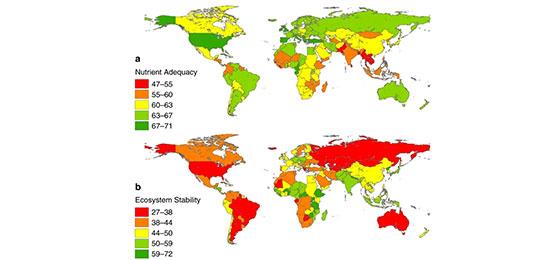Completed research project: Impacts of Swiss food consumption and trade
19.07.2021
The first detailed multi-indicator sustainability assessment of global food systems conducted by Alexander Mathys and his team at the ETH Zurich revealed that the focus for sustainable food systems should be on alternative animal proteins and avoiding food waste. A significant transition from animal foods to plant/ single cell-based foods would improve the nutritional, environmental and social scores for most high-income countries, including Switzerland. According to the model, the recommendation of the Swiss Society for Nutrition is the most sustainable dier and is projected to result in 36% lesser environmental footprint, 33% lesser expenditures and 2.67% lower adverse health outcome compared with the current diet.
Globally, around 1/3 of the world’s food is lost or wasted every year (1.3 billion tonnes globally, 2.6 million tonnes in Switzerland)). This corresponds to 65 kg of food per year per person, globally. Innovative approaches that could avoid, reduce and reuse food waste are urgently needed. The ETH Zurich Sustainable Food Processing group focuses here on black soldier fly larvae-based waste utilization to produce more sustainable insect-based feeds, for biorefinery to produce microalgae-based meat substitutes, lipids and functional ingredients, or the introduction of yellow peas into processed foods such as cereals, pasta and bread, to improve their carbon footprint and nutritional value.
The three key recommendations of the project are:
- National and global policy-makers should determine key areas of food systems improvement and set priorities based on the holistic multi-indicator approaches for both human and planetary health.
- Swiss consumers are encouraged to increase the intake of legumes, nuts and seeds, fruits, and vegetables, reduce their consumption of meat products, and minimize food waste.
- Stakeholders in the food industry and food supply chain should take nutrition and environmental sustainability perspectives into consideration to achieve the correlating benefits of business development and social welfare.
Peer-reviewed publications of the research project:
- Chen, C., Chaudhary*, A. & Mathys, A. (2020). Nutritional and environmental losses embedded in global food waste. Resources, Conservation and Recycling, 160: 104912.
https://doi.org/10.1016/j.resconrec.2020.104912 - Chen, C., Chaudhary*, A. & Mathys, A. (2019). Dietary Change Scenarios and Implications for Environmental, Nutrition, Human Health and Economic Dimensions of Food Sustainability. Nutrients, 11: 856. https://doi.org/10.3390/nu11040856
- Chaudhary*, A., Gustafson, D. & Mathys, A. (2018). Multi-indicator sustainability assessment of global food systems. Nature Communications, 9: 848. https://doi.org/10.1038/s41467-018-03308-7
- Chaudhary*, A., Marinangeli, C. P. F., Tremorin, D. & Mathys, A. (2018). Nutritional Combined Greenhouse Gas Life Cycle Analysis for Incorporating Canadian Yellow Pea into Cereal-Based Food Products. Nutrients, 10: 490. https://doi.org/10.3390/nu10040490
Figure: Nutrition and Environmental metrics scores per country. a Food Nutrition Adequacy and b Ecosystem Stability scores for all countries calculated in this study (based on data for the year 2011). Metric score is arithmetic average of its underlying indicator scores (normalized to 0–100). It can be seen that most countries with high Food Nutrient Adequacy score low on Ecosystem Stability, pointing toward high environmental impacts associated with their diets. Source: Chaudhary, Gustafson & Mathys (2018). Nature Communications, 9: 848
